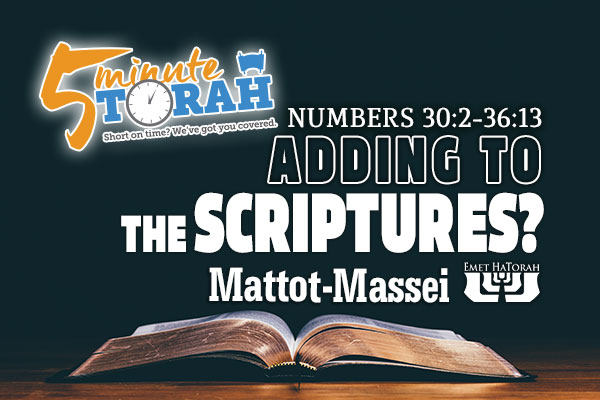Adding To The Scriptures?
Series:

Parashat Mattot-Massei: Numbers 30:2-36:13
Many people take objection to the concept of rabbinic authority and the corpus of Jewish law, which includes the Mishnah and Talmud. They see these rabbinic works as “adding” manmade laws to the Scriptures, because indeed they contain countless laws that do not seem to appear in the Scriptures themselves. Therefore, these rabbinic works are seen as violating one of the primary principles of Scripture, to not add to the Scripture. The prooftext for this prohibition is found in Deuteronomy:
“Everything that I command you, you shall be careful to do. You shall not add to it or take from it.” (Deuteronomy 12:32)
And while we do need to be extremely cautious with anything that is not clearly spelled out in Scripture, we should also realize that the Scriptures themselves give a person permission to add to its own list of obligations and prohibitions. How so? This week’s portion gives us the answer: “If a man vows a vow to the LORD, or swears an oath to bind himself by a pledge, he shall not break his word. He shall do according to all that proceeds out of his mouth” (Numbers 30:2). When we make a vow or an oath, we have created a new restriction upon ourselves that is above and beyond the commandments of the Scriptures, but is on the same par with them in regard to obligation. We have, in a sense, “added” to Scripture, but with the permission of Scripture.
There is an instance recorded for us where this privilege backfires because of a foolish vow. In the book of Judges, we read about a man named Jephthah who made a foolish vow to the LORD in order to gain victory over Israel’s enemies. He made this declaration:
If you will give the Ammonites into my hand, then whatever comes out from the doors of my house to meet me when I return in peace from the Ammonites shall be the LORD's, and I will offer it up for a burnt offering. (Judges 11:30–31)
Victory was given, but only when he returned home did he realize the implications of his vow:
Then Jephthah came to his home at Mizpah. And behold, his daughter came out to meet him with tambourines and with dances. She was his only child; besides her he had neither son nor daughter. And as soon as he saw her, he tore his clothes … (Judges 11:34–35)
This is why both Yeshua and our sages have spoken so harshly against making either vows or oaths. They are both in agreement that it would be better if a person would not make either a vow or an oath at all. Yeshua taught his disciples this principle by saying:
Again you have heard that it was said to those of old, ‘You shall not swear falsely, but shall perform to the Lord what you have sworn.’ But I say to you, Do not take an oath at all, either by heaven, for it is the throne of God, or by the earth, for it is his footstool, or by Jerusalem, for it is the city of the great King. And do not take an oath by your head, for you cannot make one hair white or black. Let what you say be simply ‘Yes’ or ‘No’; anything more than this comes from evil. (Matthew 5:33-37)
Yeshua bases his instruction on the wisdom of Ecclesiastes, which says, “It is better that you should not vow than that you should vow and not pay” (Ecclesiastes 5:4[5]). The Talmud records Rabbi Meir coming to the same conclusion as Yeshua, saying that it would be better for one to not make a vow at all (Chullin 2a).
In the modern world words are cheap, and very rarely does anyone back them up with action. If a vow or oath has been made it can easily be broken. We see this exemplified in the high divorce rates and endless cases of litigations that fill our courtrooms. Although many may not take their words seriously at the moment, one day all will be taken into account and a high price will be paid for these foolish words:
I tell you, on the day of judgment people will give account for every careless word they speak, for by your words you will be justified, and by your words you will be condemned. (Matthew 12:36–37)
Our words matter. The Torah obligates us to all that we speak as if it were a commandment itself. May the words we say be continually guarded. May our “yes” be “yes,” and our “no” be “no” so that we can bring glory to our Heavenly Father.








